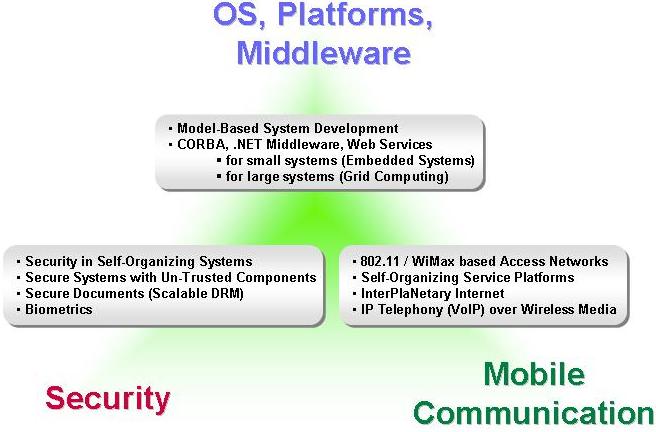We want to be our student's partner of choice for obtaining high quality education in the areas Operating Systems/Platforms, Security and
Mobile Communication Networks, that is also recognized as such by their future employers. Based on feedback from industry, past graduates and results from our technology research, we will continuously develop, evaluate and adjust all lectures to prepare our students for their future work life and enable them to pursue attractive career opportunities. In addition to being good educators, we strive to be excellent researchers in our core competency areas. We actively seek cooperation with like-minded individuals and institutions. We will aggressively publish the results of our work - for the benefit of the general public.  | | Areas of interest.
|
Values
(Eight Principles of Education - taken from the book “The New Professor's Handbook - A Guide to Teaching and Research in Engineering and Science” by Davidson and Ambrose, 1994)1. Encourage active learning - students should: be prepared to work hard when they enter a classroom, take an active role in acquiring and maintaining new information during class, continue their interest doing homework assignments. Faculty can: ask frequent questions to arouse curiosity; present thought-provoking problems to encourage critical thinking; provide students with concrete, real-life situations to analyze; and use different teaching styles in their classes to engage students with different learning styles. 2. Design effective learning experiences for students - because most learning in a typical class takes place out of class, faculty should design activities that will help students learn after class hours, e.g., reading assignments, homework problems, group projects, laboratory assignments, and computer exercises. 3. Provide prompt feedback - because learning is an iterative process in which students apply a new concept, discover errors in their application, and try again, faculty should provide feedback to students as promptly as possible and that feedback should be corrective and supportive. 4. Emphasize the importance of time and effort spent learning - students must make effective use of time in and out of the classroom to be successful in learning a subject. Faculty should emphasize the importance of putting in that effort. Faculty can discuss with students effective study habits and time management, and they can plan their learning activities to permit the best use of their time and the student’s time. 5. Encourage student-faculty contact - because interaction between faculty and student is at the very heart of the educational process, faculty should interact effectively with students in the classroom displaying enthusiasm, sensitivity, and command of the subject matter. They should also allow time for effective interaction outside of class during office hours, student societies and society functions, and departmental social activities. 6. Encourage cooperation among students - cooperative/collaborative learning is a powerful tool to enhance student mastery of a subject, and promoting interactions among students in a class can have a marked positive effect by enhancing student self-esteem, improving collaborative and teamwork skills, and developing personal responsibility. Faculty can encourage these interactions by organizing cooperative in-class exercises such as group discussions and group projects as well as activities outside of class. 7. Communicate high expectations - students respond positively to difficult classes through high ratings, high attendance, and high engagement Teachers who demand a lot of their students have the most successful classes in terms of student enjoyment and learning. Faculty should set high but attainable goals, make expectations clear, and emphasize the intrinsic rewards of their hard efforts, i.e., mastery of material and success in later endeavors. 8. Respect diverse talents and ways of learning - because students bring unique sets of abilities, interests, and experiences (which translate into different ways of learning) to the classroom, faculty need to vary their teaching styles to match the students’ various learning styles and different personalities. Faculty should become familiar with the concepts of teaching styles and learning styles, and they should use a variety of teaching styles in the classroom to insure that all students are engaged in learning.
Why do we need a mission?In a discussion between Alice and the Cheshire Cat in Lewis Carroll's Alice's Adventures in Wonderland, Alice asks: "Would you tell me, please, which way I ought to walk from here?"
"That depends a good deal on where you want to get to," said the Cat.
"I don't much care where -" said Alice.
"Then it doesn't matter which way you walk," said the Cat. | 